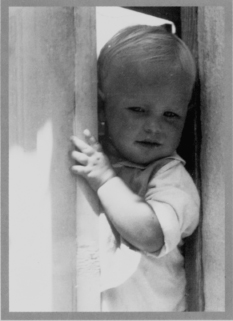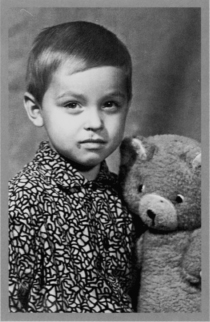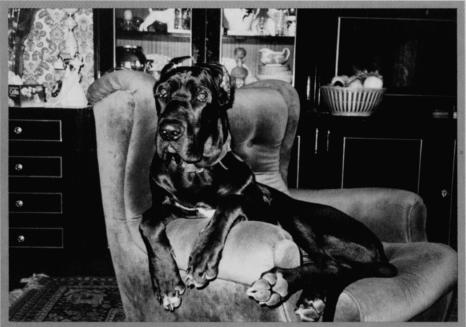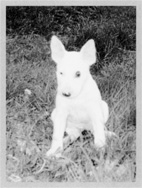My Sergei (15 page)
Authors: Ekaterina Gordeeva,E. M. Swift
Our off-ice training included other sports like skiing.Here we are in 1989 in Terskul with (left to right) a trainer, our choreographer Marina Zueva, our coach Stanislav Leonovich.

Here I am, long before I put on my first pair of skates.

One of my favorite pictures of Sergei as a young boy.

Veld, our beloved Great Dane.
I do remember both my grandmothers praying, however. Babushka kept an icon on the wall at home. And my other grandmother,
my father’s mother, who lived in another apartment in Moscow, had an icon that she kept behind a curtain so people wouldn’t
see it when they walked in. She would light a little candle, the kind that is just a wick floating in oil, and would pray
to this icon every night. I had never seen this done before, and when I was visiting her one time, I asked what she was doing.
She told me she was praying, and said that when I got older, I’d pray, too. So when I was young I thought that only grandmothers
prayed.
In the cathedrals, though, the smell of the incense made me feel sick to my stomach. I thought that death smelled this way.
Sergei was the one who took me to a church for the first time in Milan, saying, “You definitely have to see this, Katuuh,
because you may never be back again.” He was interested, not because he was religious, but because the cathedral was so beautiful.
He told me it was okay. “Don’t be frightened,” he said. “I’ll hold your hand.” Then he explained it was not a cemetery. That
it was incense I smelled, not death. “It’s a beautiful building,” he said. “It’s history.”
He took me inside, and with him holding my hand, all these stupid fears went away.
So I was no longer frightened when, in Paris, we went to the cathedral of Notre Dame, and afterward we sat on the steps out
front and watched the people. It is a wonderful place to people watch, the steps of Notre Dame. Walking through the city,
through Paris, in spring, being in love—what else could you wish for in life? It was here that I first said “I love you”
to Sergei.
We thought we’d come back sometime and spend ten days there at least, just walking around Paris when the weather was nice.
It was one of our dreams. But of course we never did.
A
fterward we were invited to do the European tour, and
Sergei and I were too shy to ask for our own room. My roommate was Elena Bechke, another pairs skater from Russia, and so
many times she would try to get in, but the door would be locked, and it was very embarrassing for everyone. Everyone now
knew that Sergei and I had a relationship.
It was still important for me to skate well, and because my body had changed, and the European rinks were cold, and we had
very little opportunity to warm up, I often made mistakes. I’d get upset, as usual, and would put on a big frown. Sergei would
try to cheer me up: “Don’t be upset, Katuuh, we have another show tomorrow.” But sometimes he just gave up.
Other people, however, would misunderstand. “Katia, is everything all right?” the other skaters would ask when they saw my
face. They assumed this expression could only have been caused if something was wrong between me and Sergei. I didn’t like
it when people asked me these things.
I sometimes would be sad the whole next day, not smiling, not speaking, because I missed a jump. I’d be wondering, Am I not
working hard enough? Should I be spending less time touring and more time at the gym? Should I only practice my jumps? What
will happen next fall? Sometimes I couldn’t even explain to Sergei all the different worries that were in my head. It wasn’t
for another year that he figured out there was nothing he could say to make me feel better if I was not skating well. I never
learned to leave my skating on the ice, where it belonged. The only thing he could do was take my hand. This never changed.
Just by touching me Sergei could fix a problem.
He started to suggest books for me to read.
Gone With the Wind
was one, and I liked it very much. But I had no memory for books. If I read a book, I’d forget what it was about tomorrow;
and the day after tomorrow, I’d have forgotten I ever read it in the first place. I don’t know what I think about when I read.
But Sergei remembered everything. He hungered for information. Sergei’s favorite authors were Boris Pasternak—he read
Doctor Zhivago
three times—Chekhov, and Mikhail Bulgakov, who wrote his favorite book,
Master and Margarita
. He could have read this book year after year.
Marina used to take us to museums, and she’d be explaining some painting to us, when out of the blue Sergei would say something
that showed he already knew very well the meaning of the painting. I don’t know where he found the time to read so much. He’d
rather read a book than watch a movie, or play golf, or almost anything, and if you tried to interrupt him, it was as if he
were suddenly deaf and you were invisible.
Sergei was also crazy about dogs. He could talk about dogs all day long, and so could Marina. Once the three of us drove from
Megeve, where we trained, to Paris—a six-hour drive—and the whole way he and Marina talked about dogs. So that spring,
after the tour, he got a bullterrier puppy that he named Moshka. It was white, with a black ring around its left eye. He picked
it out with my mother, and they brought it home in a basket.

Moshka
In mid-May Sergei, Moshka, and I went to our dacha for ten days, just the three of us. This was now a new dacha, which I had
helped my parents purchase in the village of Ligooshina, which means “froggy village,” even though I never saw any frogs.
The apple trees were in blossom, the grass was green, and everything was fresh with spring. We did nothing in those ten days,
no training, no jogging. We just relaxed and played with the dog. Almost every evening we made a fire to cook on, and I’d
make Sergei a shish kebab. When the fire had burned down to coals, we’d throw potatoes into the coals to bake them, completely
unwrapped. When they were cooked Sergei would peel them for me, because they were too hot for my hands to hold.
It was the first time Sergei and I had ever spent so much time alone together. I didn’t see any different sides to him than
those I already knew. He was calm and happy, never moody. He loved to play with his dog, and would carefully cut fresh meat
for Moshka every day, which we’d cook very quickly by pouring boiling water over it. There was no dog food in Ligooshina.
I cooked for Sergei, big breakfasts and creative dinners: sausages, chicken, meat, eggs. He liked whatever I made him. My
grandmother had taught me to cook.
My favorite thing, then and always, was to drive with Sergei in the car. This was our chance to be alone. Before he got his
apartment, we used to laugh that we would probably live in a car someday, set up house there and raise our children. A little
stove in the glove compartment. I’d put my head on his shoulder as he drove, and Sergei would listen to music—Bon Jovi,
Annie Lennox. The last couple of years he’d started listening to Russian rock groups, too, because he liked the lyrics. He’d
drive until he found a nice place to stop, then we’d talk or kiss. He gave me cognac sometimes so I’d relax. He told me the
first time, “Try it, Katoosha. It’s very nice.” And he was right.
I still like the taste of cognac. It doesn’t make you crazy, it just warms you from the inside out, like a cozy fire. It remains
burned in my memory that it was always exciting to be in a car with Sergei, when it was dark outside and he was driving.
• • •
Marina chose
Romeo and Juliet
for us to skate to in the 1989/90 season. There were two variations that we listened to, one by Prokofiev and one by Tchaikovsky,
and she asked us which one we preferred. It was the first time she’d ever given us a chance to choose, and we liked the Tchaikovsky
variation right away, because it sounded more danceable. I was excited about the program, and went to the
Romeo and Juliet
ballet to get some ideas. Marina got Vladislav Kostin from the Bolshoi Ballet to do our costumes. The whole process of creating
this program felt different.
We decided to do our elements—the throws, the lifts, the spirals—in a different order than usual. We thought we should
listen to the music and decide what elements fit the music, rather than do the death spiral at the end, for example, because
that’s when death spirals are done. And we were surprised to discover that it was easier to skate that way.
Sergei was never the first to suggest something. He’d be standing over by the boards, quiet, so quiet, while Marina, Leonovich,
and I would be trying to put a certain element into a particular part of the program, maybe our side-by-side double axels.
Then Sergei would simply say this element doesn’t go there. And he’d be right. Working on this
Romeo and Juliet
program was the first time that Marina began to trust, even depend on, Sergei’s judgment. He wouldn’t even try to do an element
in a section if he knew it didn’t fit. He wasn’t going to break himself in half trying to learn something that he intuitively
knew didn’t feel right. If he liked it, though, he said so immediately.
I felt like we had reached the next level in our skating. Marina sensed it, too. She had seen us walking hand in hand together
in the street, whereas before we would never touch each other in public. It gave her more range and flexibility in creating
her programs. We could touch each other in new ways on the ice, even kiss each other.
Training camp in the summer of 1989 was first in Georgia, in Sukhumi, and then in a ski resort in the mountains called Terskul.
I remember Terskul very well because of a scary thing that happened to me there. I was in a room by myself, with Sergei in
a room next door. We never stayed the night together when we were training.
In the middle of the night I heard a banging at my balcony window. For some reason I had left my light on, and I sleepily
opened the balcony door to find two men in their thirties, complete strangers, standing there. They explained that they had
locked themselves out of the hotel, and because mine was the only light still shining, they’d climbed up to see if I would
let them into the hotel. I don’t know how they did this, since I was on the fifth floor. I didn’t even think it might be dangerous.